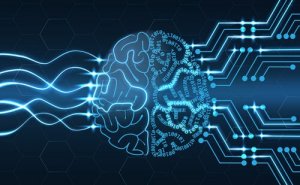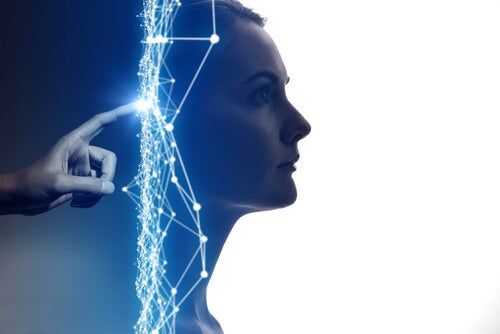Artificial Intelligence and Psychology


Written and verified by the psychologist María Alejandra Castro Arbeláez
There’s a link between artificial intelligence and psychology. This article will deepen the definition and consequences of this relationship. Continue reading to find out more.
Let’s start by defining each of these disciplines. The word “psychology”, according to Merriam-Webster, “is the science of mind and behavior and the mental or behavioral characteristics of an individual or group”. Likewise, they define the term “artificial intelligence” as “a branch of computer science dealing with the simulation of intelligent behavior in computers and the capability of a machine to imitate humans”.
“The saddest aspect of life right now is that science gathers knowledge faster than society gathers wisdom.”
-Isaac Asimov-
Branches of psychology that are associated with artificial intelligence

Psychology and artificial intelligence are interconnected. Both point to mental processes, behavior, and emotions. But the fact that these are different disciplines doesn’t mean they’re mutually exclusive.
Let’s look at the branches of psychology pertaining to artificial intelligence:
- Educational psychology. Pedagogical innovation addresses learning in a different, but effective way. It uses elements of artificial intelligence for it. For example, intelligent tutor systems, educational robotics, and neuroeducation.
- Neurosciences. Artificial intelligence enhances research in this field.
- Clinic. Will robots replace psychologists?
- Cognitive psychology. It originated from cybernetic paradigms. In addition, it influenced the understanding of human capabilities. In fact, the investigation continues to contribute more knowledge about this. For example, in his article “Artificial intelligence: myths and realities” Hugo D’Alarcao shows the processes that psychology has gone through as a science. He also shows its connection in the context of interdisciplinary work with artificial intelligence. Thus, according to the author, these sciences continuously influence each other.
- Organizational. One of the challenges of this branch of psychology is to enhance the selection process through artificial intelligence systems.
- Forensic. You can use artificial intelligence in crime simulations.
As you can see, some fields of psychology have a lot to gain from artificial intelligence. And both have clear contributions to other areas of research. Carlos González Tardón is a psychologist who wrote an article on the subject. He talks about how simulated beings can intervene in psychology and psychotherapy. He also provides information on new tools in experimental psychology.
Artificial intelligence and psychology in current and future psychotherapy
Currently, the progress of artificial intelligence used for promoting therapeutic processes is already here. Wonderful, right? Ideas that previously only had a place in the human imagination are now beginning to become real.
For example, robots capable of recognizing emotions that facilitate the lives of some people already exist. These assistance robots can serve as companions to people with Alzheimer’s disease, for instance. But there are many other projects that can make life easier for those who need mobility assistance. How amazing!
But artificial intelligence is more than creating robots with human characteristics. These systems are also suitable in psychotherapeutic processes. For example, therapists work through virtual reality with their patients.

Ethical issues
The idea of having revolutionary methods that promote human well-being may seem wonderful. But there are some ethical problems to solve before one can integrate them into the everyday landscape.
No doubt technological assistance can improve the quality of life of many people. More families fall apart every day and time seems to compress in the increasing number of open fronts everyone has.
For instance, when you install a program on your computer or an application on your phone, you agree to conditions you seldom read. You think that if everyone else accepts them, then you should too. When you do so, you grant many privileges you’re not even aware of.
Somehow, you delegate a review you should do to others. On another level, just look at how social networks work.
Your friends’ walls are constantly surrounded by advertising and other commercial interests. These meeting places are run by economic initiatives eager to know your tastes and interests because they want to profit from you.
Also, every psychologist in his profession is governed by a code of ethics. They’re aware of the rules and know they’ll have to respond to the relevant authority if they break them. This is a level of consciousness a machine can’t reach yet.
Conclusion
Perhaps the two great dangers in the association between artificial intelligence and psychology are:
- Sharing sensitive data with a machine programmed in a language the user doesn’t know.
- The lack of awareness regarding standards or the code of ethics that regulates certain services, benefits, and activities.
There’s a link between artificial intelligence and psychology. This article will deepen the definition and consequences of this relationship. Continue reading to find out more.
Let’s start by defining each of these disciplines. The word “psychology”, according to Merriam-Webster, “is the science of mind and behavior and the mental or behavioral characteristics of an individual or group”. Likewise, they define the term “artificial intelligence” as “a branch of computer science dealing with the simulation of intelligent behavior in computers and the capability of a machine to imitate humans”.
“The saddest aspect of life right now is that science gathers knowledge faster than society gathers wisdom.”
-Isaac Asimov-
Branches of psychology that are associated with artificial intelligence

Psychology and artificial intelligence are interconnected. Both point to mental processes, behavior, and emotions. But the fact that these are different disciplines doesn’t mean they’re mutually exclusive.
Let’s look at the branches of psychology pertaining to artificial intelligence:
- Educational psychology. Pedagogical innovation addresses learning in a different, but effective way. It uses elements of artificial intelligence for it. For example, intelligent tutor systems, educational robotics, and neuroeducation.
- Neurosciences. Artificial intelligence enhances research in this field.
- Clinic. Will robots replace psychologists?
- Cognitive psychology. It originated from cybernetic paradigms. In addition, it influenced the understanding of human capabilities. In fact, the investigation continues to contribute more knowledge about this. For example, in his article “Artificial intelligence: myths and realities” Hugo D’Alarcao shows the processes that psychology has gone through as a science. He also shows its connection in the context of interdisciplinary work with artificial intelligence. Thus, according to the author, these sciences continuously influence each other.
- Organizational. One of the challenges of this branch of psychology is to enhance the selection process through artificial intelligence systems.
- Forensic. You can use artificial intelligence in crime simulations.
As you can see, some fields of psychology have a lot to gain from artificial intelligence. And both have clear contributions to other areas of research. Carlos González Tardón is a psychologist who wrote an article on the subject. He talks about how simulated beings can intervene in psychology and psychotherapy. He also provides information on new tools in experimental psychology.
Artificial intelligence and psychology in current and future psychotherapy
Currently, the progress of artificial intelligence used for promoting therapeutic processes is already here. Wonderful, right? Ideas that previously only had a place in the human imagination are now beginning to become real.
For example, robots capable of recognizing emotions that facilitate the lives of some people already exist. These assistance robots can serve as companions to people with Alzheimer’s disease, for instance. But there are many other projects that can make life easier for those who need mobility assistance. How amazing!
But artificial intelligence is more than creating robots with human characteristics. These systems are also suitable in psychotherapeutic processes. For example, therapists work through virtual reality with their patients.

Ethical issues
The idea of having revolutionary methods that promote human well-being may seem wonderful. But there are some ethical problems to solve before one can integrate them into the everyday landscape.
No doubt technological assistance can improve the quality of life of many people. More families fall apart every day and time seems to compress in the increasing number of open fronts everyone has.
For instance, when you install a program on your computer or an application on your phone, you agree to conditions you seldom read. You think that if everyone else accepts them, then you should too. When you do so, you grant many privileges you’re not even aware of.
Somehow, you delegate a review you should do to others. On another level, just look at how social networks work.
Your friends’ walls are constantly surrounded by advertising and other commercial interests. These meeting places are run by economic initiatives eager to know your tastes and interests because they want to profit from you.
Also, every psychologist in his profession is governed by a code of ethics. They’re aware of the rules and know they’ll have to respond to the relevant authority if they break them. This is a level of consciousness a machine can’t reach yet.
Conclusion
Perhaps the two great dangers in the association between artificial intelligence and psychology are:
- Sharing sensitive data with a machine programmed in a language the user doesn’t know.
- The lack of awareness regarding standards or the code of ethics that regulates certain services, benefits, and activities.
All cited sources were thoroughly reviewed by our team to ensure their quality, reliability, currency, and validity. The bibliography of this article was considered reliable and of academic or scientific accuracy.
Franco, L.A.R. (2014). Psicología cognitiva e inteligencia artificial: mitos y verdades. Avances en psicología, 22 (1), 21-27.
González Tardón, C.G. (2006). Interacción con Seres Simuladas. Nuevas Herramientas en Psicología Experiemental. En Una perspectiva de la inteligencia artificial en su 50 aniversario: Campus Multidisciplinar en Percepción e Inteligencia, CMPI 2006, Albacete, España, 10-14 de Julio del 2006 actas. Universidad de Castilla y la Mancha, pp. 438-449.
This text is provided for informational purposes only and does not replace consultation with a professional. If in doubt, consult your specialist.







